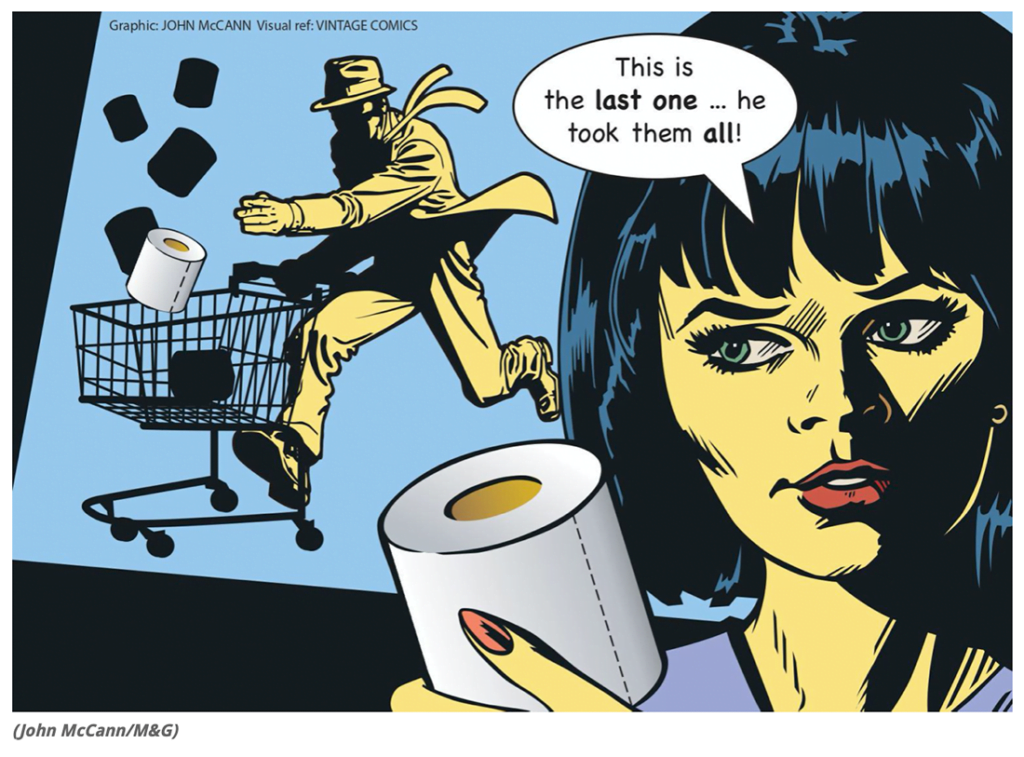NEWS | Tshegofatso Mathe | 19 Mar 2020
Experts have told the Mail & Guardian that it’s unnecessary for most shoppers to stock up on food supplies because of the panic created by the spread of Covid-19 as it will only put pressure on the local food supply chain.
This week, shelves were left empty at major South African retailers as shoppers hurried to buy canned foods, hygiene products and, most surprisingly, toilet paper as fears rose amid the spread of Covid-19.
This has happened in other parts of the world too.
The novel coronavirus has created a wave of uncertainty and worry that has seen stock markets in different countries plummet and global growth projections being revised down as production in China, the second biggest economy slowed.
But now the panic is being seen in individuals who are stocking up on supplies before they self-isolate, theoretically until the virus does not have anyone else to infect.
The behaviour change occurred after President Cyril Ramaphosa declared a national state of disaster in terms of the Disaster Management Act on Sunday as a means to combat the spread of the virus.
Wandile Sihlobo, chief economist of the agricultural business chamber of South Africa (Agbiz), said bulk buying can be explained by using a theory in behavioural economics called information cascading.
He said what is happening is one person is irrationally buying groceries and the next person does the same because of the fear that those goods might be finished before they get them and the behaviour multiplies.
Sihlobo said there is no need for people to act in this way because South Africa is a net exporter of food and agricultural products. Meaning we produce more than we need. He added that in value terms roughly half of what the country produces is worth $10-million.
Sihlobo also said that this year, they are expecting double digit increases in the harvest of major grains such as maize and soybeans and a good rebound on citrus fruits and others.
“We have enough food, there is no need for people to rush [to buy food],” he said.
Dr Ferdi Meyer, director and soft commodity analyst at the Bureau for Food and Agricultural Policy, said South Africa will not run out of food but there will be certain items that might run out because of the disruptions in the supply chains.
He said people are overbuying and this might create a concern that the shortfall is because of Covid-19, and this is not the case.
Meyer explained that people buying quantities that they would normally not buy are causing a spike that suppliers might have not anticipated and that could cause a shortage.
Sihlobo added that it’s the readiness of the domestic food supply chains which will perhaps be the ones most tested in the coming weeks and months if panic-buying were to peak to levels seen in the UK, USA and in other countries.
Although there is enough food to go around, there are specific food items, such as rice, wheat and palm oil, for which the country is dependent on imports.
Palm oil suppliers are Indonesia and Malaysia. The typical suppliers of rice are Thailand, India, Pakistan, China and Vietnam, some of which have been hard hit by the pandemic.
Meyer said this is not a cause of concern yet because we still have enough in stock. He added that in extreme cases, where certain ports for these goods might be closed because of the virus, South Africa will find them elsewhere.
He said that there are many other areas from where they can be sourced, such as Canada, United States and Australia
Meyer said that what is of concern is if demand reduces due to the virus, because the country exports 50% of its food to Asia and Europe. This might negatively affect the farming community.
“If anything happens in the supply chain in those areas as demand gets to decline as people go to self isolation. Increase supply in the domestic market and prices would decline and if you are a farmer or exporter, you lose money” he said.
But inversely, because of the surplus of food in the South African market due to low international demand, this would decrease food prices.
Retailers have called for shoppers to buy what they need and remain calm.
Woolworths said they have seen an increase in purchase of certain products in its physical and online stores and is working to meet the increase in demand. It said in order to ensure enough products for everyone, they have set a limit of five units per product per customer.
While people are hoarding groceries at Woolworths, Pick n Pay said their customers have been buying responsibly for the most part, stocking up on what they usually buy.
The store said, over the past week, it has seen an increase of people buying more household cleaning and personal hygiene products, as well as dry groceries.
“We have been preparing for the coronavirus for some weeks, working closely with our suppliers to make sure we have stocks in our stores and that customers can get what they want and need.
“Customers should be assured that we have a very good relationship with our suppliers, and that we will have stocks available in our stores,” said Pick n Pay.
Shoprite appealed to its customers to please “think before they buy and only buy what their families need, so that others are not left without much-needed items.
“If we all shop as we normally do, our stores will soon return to normal and there will not be empty shelves,” said Shoprite’s group chief executive Pieter Engelbrecht.
Engelbrecht said they have new stock arriving regularly and they are working around the clock to keep shelves stocked.
Tshegofatso Mathe is an Adamela Trust business reporter at the Mail & Guardian


